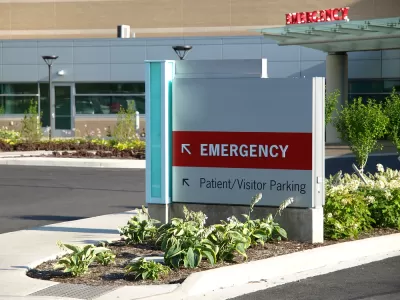Given the fact that many homeless patients end up costing the system a lot more than average, several Chicago hospitals are considering ways to house them.

Many chronically homeless people also struggle with chronic illness. Permanent housing could reduce their costly dependence on the public medical safety net. Kristen Schorsch writes, "Research shows having a home reduces ER trips and hospitalizations as well as jail and detox time. A permanent address also boosts the rates that patients regularly see doctors who focus on prevention. Hospitals save money by not providing unnecessary care for little or no reimbursement."
Meanwhile, the University of Illinois Better Health Through Housing program has been piloting such an effort for several years. During 2015 and 2016, "The system spent about $250,000 to house 26 patients. The average monthly medical costs per person declined from about $5,900, to around $4,800 after they found housing."
FULL STORY: Why more Chicago hospitals are getting into the housing business

Maui's Vacation Rental Debate Turns Ugly
Verbal attacks, misinformation campaigns and fistfights plague a high-stakes debate to convert thousands of vacation rentals into long-term housing.

Planetizen Federal Action Tracker
A weekly monitor of how Trump’s orders and actions are impacting planners and planning in America.

San Francisco Suspends Traffic Calming Amidst Record Deaths
Citing “a challenging fiscal landscape,” the city will cease the program on the heels of 42 traffic deaths, including 24 pedestrians.

Defunct Pittsburgh Power Plant to Become Residential Tower
A decommissioned steam heat plant will be redeveloped into almost 100 affordable housing units.

Trump Prompts Restructuring of Transportation Research Board in “Unprecedented Overreach”
The TRB has eliminated more than half of its committees including those focused on climate, equity, and cities.

Amtrak Rolls Out New Orleans to Alabama “Mardi Gras” Train
The new service will operate morning and evening departures between Mobile and New Orleans.
Urban Design for Planners 1: Software Tools
This six-course series explores essential urban design concepts using open source software and equips planners with the tools they need to participate fully in the urban design process.
Planning for Universal Design
Learn the tools for implementing Universal Design in planning regulations.
Heyer Gruel & Associates PA
JM Goldson LLC
Custer County Colorado
City of Camden Redevelopment Agency
City of Astoria
Transportation Research & Education Center (TREC) at Portland State University
Jefferson Parish Government
Camden Redevelopment Agency
City of Claremont




























